prehend-, prehens-
(Latin: to grasp or to understand, to seize; to reach, to hold, to take)
1. A long-term confinement in an institution or at a location for people who have been convicted of serious crimes: The neighbor's son was sentenced to life imprisonment for shooting another boy after an argument about who owned a bicycle.
2. Etymology: from Old French prison, inherited from Latin prehensio, prehensionem; from prehend-
2. Etymology: from Old French prison, inherited from Latin prehensio, prehensionem; from prehend-
Something which is impossible to understand because of being unintelligible: Little six-year old Jimmy's speech was full of incomprehensibilities because his words were meaningless, jumbled and incoherent.
incomprehensible (adjective), more incomprehensible, most incomprehensible
1. A reference to being difficult or impossible to understand; unintelligible: The scientist used incomprehensible jargon or specialized technical terminology during his presentation to the group of chemistry students.
2. Descriptive of something which is impossible to know or to fathom because it is so complicated or mysterious: Trying to understand why the student shot so many other people in the school was incomprehensible for other students and adults.
3. Relating to that which is not understandable or decipherable: There are many incomprehensible definitions of words in some dictionaries.
2. Descriptive of something which is impossible to know or to fathom because it is so complicated or mysterious: Trying to understand why the student shot so many other people in the school was incomprehensible for other students and adults.
3. Relating to that which is not understandable or decipherable: There are many incomprehensible definitions of words in some dictionaries.
Some people write with incomprehensible handwriting which makes it very difficult for others to know what is being presented and why.
incomprehensibly (adverb), more incomprehensibly, most incomprehensibly
Descriptive of how a circumstance or situation is impossible to understand: It is incomprehensibly difficult to believe that so many people are starving in wealthy countries and dying in wars these days.
In law, a criminal neglect of duty or the wrongful execution of official responsibilities to report information about a felony or treason: One example of a misprison is the deliberate concealment of the commission of an illegal offense or a very serious crime; such as, armed robbery.
The ability or the act of taking hold of something firmly with the hands or other parts of the body: Elephants have the prehensibility of using their trunks and monkeys also have it by utilizing their tails.
prehensible (adjective); more prehensible, most prehensible
Characteristic of a creature or a human that is able to seize and grasp something: In order for people to be prehensible, they must use their hands and fingers!
prehensile (adjective); more prehensile, most prehensile
Descriptive of animals or people who are capable of grabbing or holding something by wrapping around it: Elephants have prehensile trunks that they use to grasp and to feed themselves by holding on to whatever it is that they want to eat.
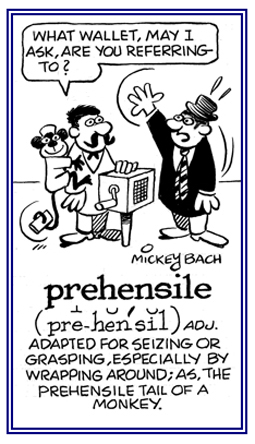
© ALL rights are reserved.
Go to this Word A Day Revisited Index

Go to this Word A Day Revisited Index
so you can see more of Mickey Bach's cartoons.
1. The quality of an appendage or organ of the body which is adapted for grasping or holding something: The hands of primates are all prehensilities to varying degrees; for example, the claws of cats function for such activities;
the feet of birds and the tongues of giraffes, and noses of elephants, etc.
2. Etymology: derived from the Latin term prehendere, meaning "to grasp".
2. Etymology: derived from the Latin term prehendere, meaning "to grasp".
The act of grasping, taking hold, or gripping something, especially with the hands: Mary was in the kitchen cooking dinner where she had a lot of prehensions to perform before the meal would be ready for consumption by her family.
Many monkeys use tail prehensions when climbing around in trees.
1. A building into which people are legally committed as a punishment for a crime or while awaiting trial: A large prison is called a "penitentiary" and the people who are kept there are called "prisoners".
2. Etymology: just like prehensile, comprehend, comprehensible, etc., prison essentially comes from Latin prehendere, "to seize".
2. Etymology: just like prehensile, comprehend, comprehensible, etc., prison essentially comes from Latin prehendere, "to seize".
From this origin, the noun prehensio, "seizure", was contracted to prensio, which in Old French was presented as prisun.
At that time, it came to be used specifically for "imprisonment" and then it became the "place of imprisonment" or a "prison".
1. A person who has no freedom because his or her life is controlled by something or someone else: Karl's wife often felt she was a prisoner of her husband because of the many restrictions he placed on her.
2. Someone who is incarcerated in a penal institution while on trial or for serving a term by a court: David's former colleague was sentenced for five years as a prisoner for embezzling money from his company.
3. Etymology: from Old French prisonier from prison; from Latin prensionem, a contraction of prehensio, "a seizing, an arrest".
2. Someone who is incarcerated in a penal institution while on trial or for serving a term by a court: David's former colleague was sentenced for five years as a prisoner for embezzling money from his company.
3. Etymology: from Old French prisonier from prison; from Latin prensionem, a contraction of prehensio, "a seizing, an arrest".
1. An honor or reward striven for in a competitive contest or anything offered as an inducement to do something in order to be won: A lottery is just one example of winning prizes.
2. That which is taken from another or something captured or seized by force, stratagem, or superior power: A prize is also anything worth striving for or a valuable possession.
3. Etymology: from Middle English prise, from Old French prise, "a taking, a thing seized, a prize, booty", from pris, past participle of prendre, "to take, to capture", from Latin prendere, "to take, to seize".
2. That which is taken from another or something captured or seized by force, stratagem, or superior power: A prize is also anything worth striving for or a valuable possession.
3. Etymology: from Middle English prise, from Old French prise, "a taking, a thing seized, a prize, booty", from pris, past participle of prendre, "to take, to capture", from Latin prendere, "to take, to seize".
reprehend (verb), reprehends; reprehended; reprehending
1. To rebuke, to censure, or to find fault with and to blame: Marge reprehended her son for not taking a bath after he got himself so muddy after he was playing in the backyard.
2. Etymology: from Latin reprehendere, "to pull back"; from re-, "back" + prehendere, "to grasp, to hold".
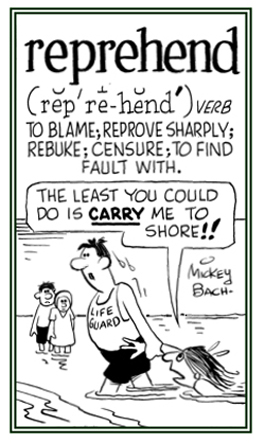
© ALL rights are reserved.
Go to this Word A Day Revisited Index
2. Etymology: from Latin reprehendere, "to pull back"; from re-, "back" + prehendere, "to grasp, to hold".

Go to this Word A Day Revisited Index
so you can see more of Mickey Bach's cartoons.
reprehensible (adjective), more reprehensible, most reprehensible
A reference to someone’s conduct or to an idea that a person has as being very bad or deserving very strong criticism: Jimmy's reprehensible behavior in his biology class resulted in his being sent to the principal and staying after school to clean up the mess he made when he knocked the samples of poultry eggs on the floor.
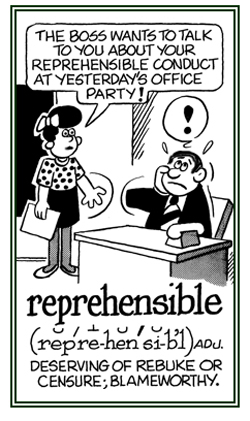
© ALL rights are reserved.
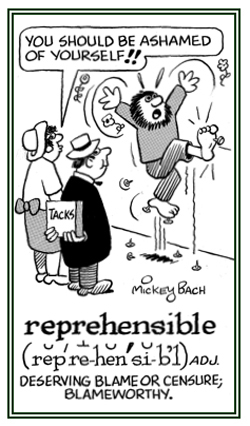
© ALL rights are reserved.
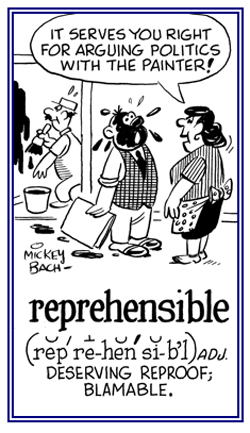
© ALL rights are reserved.
Go to this Word A Day Revisited Index





